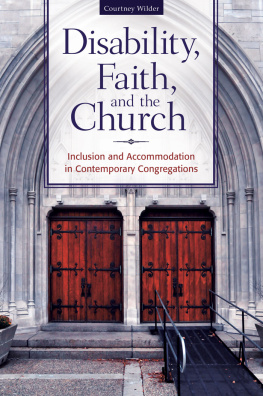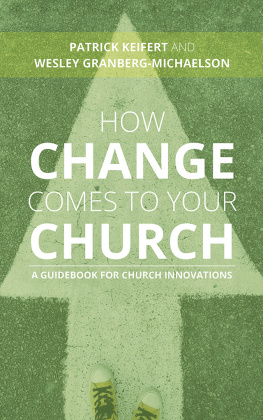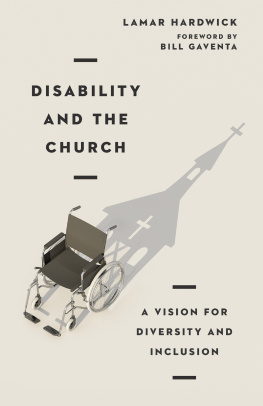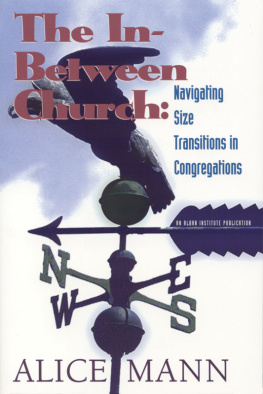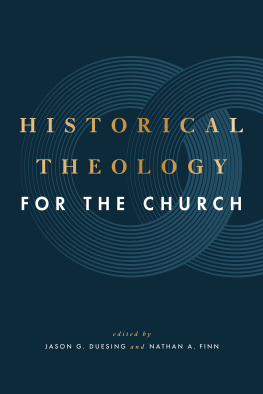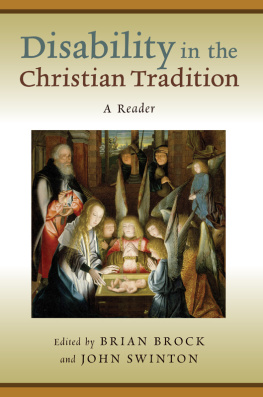Disability, Faith, and the Church
Inclusion and Accommodation in Contemporary Congregations
Courtney Wilder

Copyright 2016 by Courtney Wilder
All rights reserved. No part of this publication may be reproduced, stored in a retrieval system, or transmitted, in any form or by any means, electronic, mechanical, photocopying, recording, or otherwise, except for the inclusion of brief quotations in a review, without prior permission in writing from the publisher.
Library of Congress Cataloging-in-Publication Data
Names: Wilder, Courtney, author.
Title: Disability, faith, and the church : inclusion and accommodation in contemporary congregations / Courtney Wilder.
Description: Santa Barbara : Praeger, 2016. | Includes bibliographical references and index.
Identifiers: LCCN 2015051195 | ISBN 9781440838842 (hardcopy : alk. paper) | ISBN 9781440838859 (ebook)
Subjects: LCSH: Church work with people with disabilities. | DisabilitiesReligious aspectsChristianity.
Classification: LCC BV4460 .W475 2016 | DDC 261.8/324dc23
LC record available at http://lccn.loc.gov/2015051195
ISBN: 9781440838842
EISBN: 9781440838859
20 19 18 17 16 1 2 3 4 5
This book is also available on the World Wide Web as an eBook.
Visit www.abc-clio.com for details.
Praeger
An Imprint of ABC-CLIO, LLC
ABC-CLIO, LLC
130 Cremona Drive, P.O. Box 1911
Santa Barbara, California 93116-1911
This book is printed on acid-free paper 
Manufactured in the United States of America
To Grace and Peter Klinefelter, whose unflagging enthusiasm for all things is a joy to behold
Contents
Acknowledgments
I owe tremendous thanks to the many people who provided support, encouragement, and feedback during the writing of this book. The leaders of ministries profiled in the book were gracious with their time, welcoming as I got to know their communities, and patient with my many questions: thanks to Debbie Buchholz, Mary Ann Kelly-Wright, Carol Tillman, and their respective congregations, Deaf International Community Church, St. Joan of Arcs, and Rejoice! Lutheran Church. Equally generous were the religious leaders who agreed to be interviewed: thanks to Craig Satterlee, Kirk VanGilder, Erin Diericx, and Raedorah Stewart. Any mistakes in describing these congregations or leaders are my own.
Many other friends and colleagues provided thoughtful feedback as I wrote the book. Friends in the Association of Teaching Theologians offered insights that I returned to again and again. ELCA staff including Ron Duty and Mark Wilhelm provided me with important documents and responded at length to my many questions. Jeremy Rehwaldt and Donna Lanclos were great first readers whose feedback helped shape my argument in many places. Debbie Creamer was both encouraging and thoughtful in her responses to my inquiries. Many of my students asked questions or made observations about disability and faith that pointed me in new and interesting directions, and the support from students and colleagues at Midland University is much appreciated.
is based on a paper entitled Luther, Swinton, and the Vanishing Self: Christs Power over Despair, Suicide and Dementia presented at the American Academy of Religion Meeting, Martin Luther and Global Studies section, in November 2014. Many thanks to Ted Peters for his appreciative response to that paper and to Vitor Westhelle for his thoughtful comments.
includes work that was originally published as a column in Sightings, an online publication of the Martin Marty Center at the University of Chicago Divinity School, called Valuing All Human Beings: Disability and Reproductive Rights Meet Congress, in January 2013, and other work originally presented in a conference paper at the Upper Midwest American Academy of Religion Meeting in April 2013, entitled Feminism, Reproductive Rights, and Disability: Conflicting Accounts of Autonomy. My UMAAR colleagues have created an energetic and supportive intellectual community for students and faculty alike.
Finally, the support of the members of my congregation, Augustana Lutheran in Omaha, Nebraska, is invaluable to me. Both as I wrote and as I recovered from surgery that was scheduled midway through the writing process, my community offered encouragement, asked great questions, provided feedback, and cared for me and my children. Participation in the life of my congregation continues to renew my belief in the value of community as a religious force.
CHAPTER ONE
Introduction to Disability Theology
Introduction
Recently, at a conference I met a young man who is a seminary student. Over lunch, he talked about how he discerned a call for ministry. When he was a child, his parents had left the church, but his grandmother had helped him become familiar with stories from the Bible, and as a high school and college student he was increasingly drawn to religion and ultimately to a calling to ministry. Curious, I asked what caused his parents to leave their church. He said it wasnt only one congregation that they had left, but Christianity as a whole. He explained that as a child, his sister had an expressive speech disorder. Other people, including other children, often did not understand her speech. When they were together, he could help translate for her and provided a social buffer for her. However, in Sunday School, they were consistently separated. Without his presence and protection, she was routinely ridiculed by other kids. In none of the congregations the family attended was the Sunday School prepared to create an environment where she was welcomed and not subject to teasing and rejection from other children. They tried several churches, and in each place, the story was the same. Ultimately, his parents decided that if this was Christianity, it wasnt for them. There was no place for their child, and thus no place for them, to be recognized as part of the family of the church.
The story ends well for this young man and his sister in terms of their reconciliation to Christianity; they are now adults both involved in Christian congregations. However, their parents have not rejoined a church and took some time to accept their sons call to ministry. What might have seemed like a minor distraction or an unimportant discipline problem to a series of Sunday School teachers led to a fracture between this family and Christianity. The parents could not reconcile the treatment their daughter experienced with the promises and expectations of shared Christian life. Perhaps, the teachers did all they could; perhaps, they did not have the resources to create classrooms where each child was comfortable and safe and able to learn the gospel. They may not have had any experience with children with speech disorders; likely they were not trained professionals, but volunteers. Regardless of the reasons, the impact on this family was significant.
This is not, unfortunately, an unusual story. As we will see, people with disabilities have routinely experienced what theologian Thomas Reynolds calls theologically denigrating views of disability [that] diminish the creaturely worth of persons with disability, overlooking the broader vision of inclusive love and hospitality to which the biblical text bears witness. People living with disabilities are regularly excluded from Christian communities and positions of leadership in those communities. Christian scripture may or may not be interpreted as liberating to people with disabilities, and preaching and worship services may reinforce rather than reject biases against people with disabilities. This book explores disability as a bodily, cultural, and religious phenomenon, and I argue that while Christian churches and people have regularly failed to recognize the value and the gifts of people with disabilities both in teaching and in practice, in the biblical tradition and in Christian life, people with disabilities are present, faithful, and responding to the call to lead.

